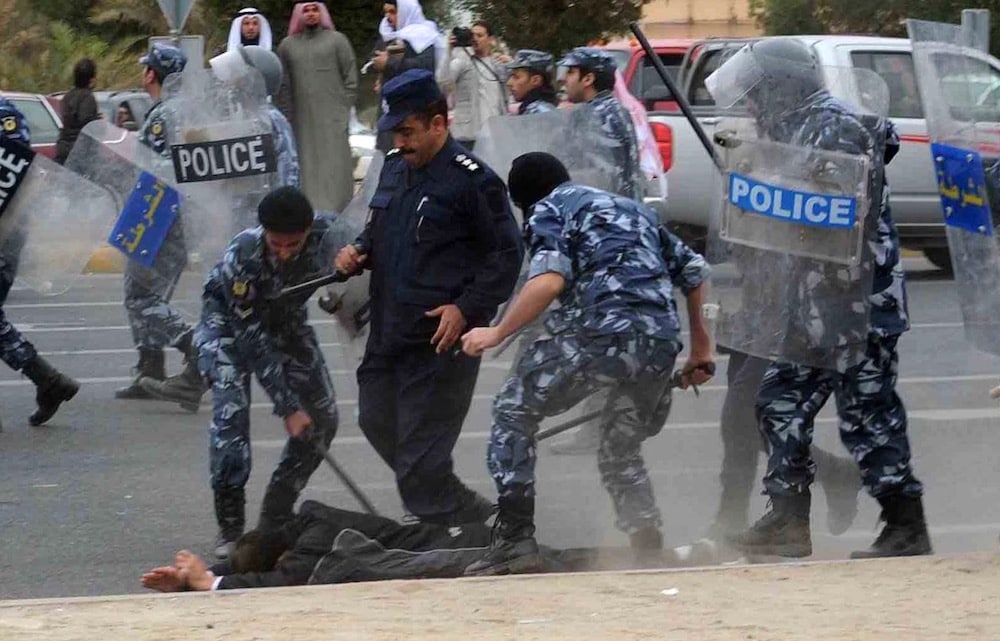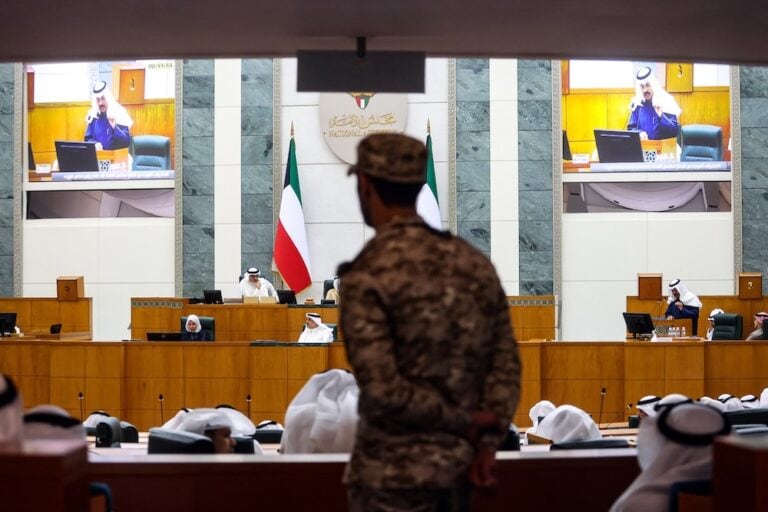International campaign calls for an end to discriminatory practices and the release of arbitrarily detained activists.
This statement was originally published on adhrb.org on 17 July 2023.
Americans for Democracy & Human Rights in Bahrain (ADHRB) has launched today an international campaign to pressure Kuwait to respect the rights of the “Bidoon” community and put an end to the violations they face in terms of access to basic services in education, healthcare, and employment, as well as freedom of expression and assembly. The campaign also calls on Kuwait to cease discriminatory practices against them and grant them citizenship.
The campaign begins by sending a letter to the Minister of Foreign Affairs of Norway, Iceland, Switzerland, the UK, and the USA, as well as the Chairpersons and members of the Foreign Affairs Committee and Joint Committee for Human Rights in the parliaments of the aforementioned countries. It also addresses the Office of the High Commissioner for Human Rights at the United Nations. The organization urges these entities to:
- Pressure the Kuwaiti government to respect its human rights obligations and to ensure that the Bidoon community is entitled to their fundamental rights, including access to education, healthcare, and basic services
- Demand the end of discriminatory practices against the Bidoon by ensuring that they are integrated into society and removing the restrictions that they currently face
- Pressure Kuwait to adopt a strategy to naturalize all Bidoon community members and end their statelessness and adhere to the international convention on this matter
- Demand the unconditional release of Bidoon activists who have been arbitrarily detained for demanding their basic rights.
The Bidoon in Kuwait face restrictions in accessing basic services such as education, healthcare, and employment, as well as systematic targeting, including mass arrests, arbitrary detention, and other unlawful attempts to suppress the civil society and public opinion advocating for the rights of the Bidoon. The Kuwaiti government’s campaign against Bidoon activists and human rights defenders demonstrates its lack of commitment towards this community, further reinforced by their refusal to accede to the United Nations Convention relating to the Status of Stateless Persons (1954) and the Convention on the Reduction of Statelessness (1961).
Despite the law claiming to provide means for the Bidoon to acquire citizenship, the naturalization procedures are unclear, and the decisions regarding applications appear arbitrary. The Bidoon do not enjoy property rights or the same access to services as Kuwaiti citizens because the government views them as illegal migrants. Consequently, they cannot obtain civil documents such as birth or marriage certificates and access high-quality education and healthcare. Moreover, individuals within the Bidoon community face additional difficulties in ending discrimination against stateless persons because nationality and residency issues are not subject to judicial review. Additionally, since women are not legally allowed to confer their nationality to their children, a child born to a Kuwaiti mother and a Bidoon father cannot obtain the mother’s nationality. Thus, children born to Bidoon parents are not entitled to the same general education or healthcare enjoyed by children born to Kuwaiti citizens.
The U.S. Department of State’s 2021 Human Rights Report shed light on some of these challenges, as they are also prevented from exercising their right to peaceful assembly and protest for their rights and expressing their dissenting opinions online. Authorities have harassed and detained Bidoon activists and subjected detained individuals to mistreatment, including arbitrary detention, physical abuse, and verbal assaults. Despite some disciplinary measures taken against involved police officers, such transgressions persist.
Additionally, their right to freedom of movement is violated as many Bidoon individuals lack travel documents and official passports. Children of the Bidoon who require medical treatment abroad have been denied travel documents, forcing them to resort to media outlets to advocate for their rights.
These circumstances have pushed the Bidoon community to take to the streets multiple times to demand equal rights. The first protests erupted on 18 February 2011, with the government promising to improve their conditions and making minor changes to appease the protests. However, on 10 March 2011, the protests reignited after the government failed to fulfill its promises. This time, the government responded with severe force, arresting over 140 individuals without charges, despite reports confirming the protests were peaceful.
Since 2019, the Bidoon community has faced increased pressure and arbitrary arrests of several individuals, including human rights defender Abdulhakim Al-Fadhli. Al-Fadhli was arrested as part of a crackdown on peaceful protesters demanding equality for the Bidoon. Twelve protesters were arrested following a protest in July 2019 after a young Bidoon man named Ayed Hamad Moudaaef, who lost his job due to the inability to obtain legal documents, committed suicide. State Security held the protesters for an extended period after the investigations concluded. It is widely believed that the authorities detain Bidoon activists away from official government prisons to conceal signs of torture and mistreatment.
Peaceful protests by the Bidoon demanding their basic rights continue, with international network NPR reporting that on 26 April 2022, six Bidoon men went on a 19-day hunger strike in front of a police station to demand their rights.
In light of these facts and the ongoing disregard of the Kuwaiti government for the basic rights of the Bidoon community, ADHRB organization calls on various international bodies to exert pressure on Kuwait to respect its human rights obligations and ensure the fundamental rights of the Bidoon community, including access to education, healthcare, and essential services, as well as respecting their right to freedom of opinion, expression, and assembly. They also call for adherence to the provisions of the United Nations Convention relating to the Status of Stateless Persons (1954) and the Convention on the Reduction of Statelessness (1961). Additionally, they urge the release of all Bidoon activists unconditionally.



